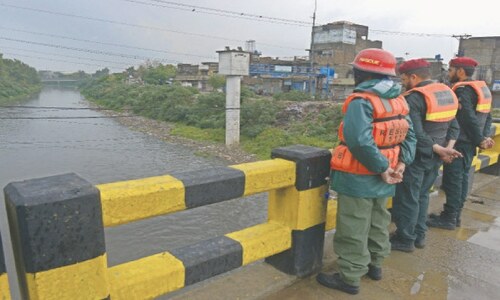
John Andrews is a consultant editor at The Economist who specialises in global politics.
He has previously worked in the Middle East, Singapore, Hong Kong, Brussels, Washington DC, Paris and California before returning to the United Kingdom.
Dawn caught up with Mr Andrews while he was in Islamabad to discuss his work and the political upheaval of the last year.
Q: How did you get started as a journalist?
A: I started as a journalist in Beirut in 1972-73. I was teaching at the American University in Beirut but I became interested in journalism and started freelancing for magazines.
I then spoke to a friend, Peter Jennings, who was a TV star from America and was then [ABC’s] bureau chief in Beirut and told him I wanted to become a journalist. He asked me to be his sound man when he went to Pakistan the next week.
That was my first trip to Pakistan in 1973 and that led me from ABC to NBC in the Middle East for three years.
Q: Your book – The World in Conflict – came out last year. Would you say trends in conflict around the world have changed?
A: There are fewer wars between the states. The only one I can remember this century is between Russia and Georgia, only five days in 2008. Now you have several conflicts in which states come a bit too close, for example, India and Pakistan in Kashmir, but it is not a war.
The architecture set up after the Second World War has meant wars no longer happen between states and I think a danger of the Trump presidency is that that particular global architecture is at risk.
The UN, WTO and other organisations have kept states interacting with each other in a peaceful way.
The second thing which has changed is better medicine, and because you no longer have wars between states, you have fewer fatalities.
The third, and in a way most important change is that most conflicts now involve asymmetric warfare. You have states threatened by guerrilla groups and I have used guerrilla as a loose term, anything from the Taliban to Farc in Colombia, who have now signed a peace deal.
And now there is a slight twist on that, which is hybrid warfare where guerrilla tactics are used alongwith cyber war and propaganda which Russia has been using very effectively in Ukraine and Crimea. In the future, there will be cyber wars if it involves states, and there will be proxy wars.
Q: Brexit was one of the defining moments in politics in 2016 - what was it like watching that happen in the UK, and what does the future of the EU look like now?
A: I am very disappointed by it. It is a risky decision- there are problems with the EU but you don’t help yourself by simply quitting it. You damage yourself and the EU.
I campaigned for us to remain in the EU and it would have been sensible to have worked within the union, which was actually going Britain’s way in terms of liberal economic policies.
Brexit has encouraged populism which is dangerous because it stokes up nationalism, which is always potentially dangerous. It also always aims for easy solutions, and the most difficult problems do not have easy solutions.
The problems of the EU can be solved, but they can’t be solved just overnight or very easily. Brexit…has encouraged populism in France - Marine Le Pen has praised Brexit, Geert Wilders in the Netherlands praised Brexit.
You’ve got countries in Eastern Europe that are Eurosceptic in a way that they weren’t before, even though they benefit hugely from being members because they are net beneficiaries and freedom of movement has really helped their economies.
It’s a tricky period, and I think one of the problems now with Brexit is that the EU has lost confidence. It doesn’t know how to revive itself. There are two competing visions: one is that it needs to have deeper integration but that runs against the counter vision which is, we need less integration, more flexibility, different tiers of membership.
I side with the second view, because I think that national instincts and the instinct to be French or German or Italian or whatever, are too strong - you can’t ignore those instincts.
One of the tragedies of the Greek crisis is that the debt relief programme and the bailout formed by the IMF, the European Central Bank and the European Commission is far too stern, and that is led basically by the Germans. Germany is a very disciplined country and the Greeks are not like that.
They don’t pay their taxes, they cheat like mad and they can hardly become like the Germans overnight - its got to be a gradual process.
The structural reforms being demanded have been too harsh.
Published in Dawn, May 11th, 2017















































Dear visitor, the comments section is undergoing an overhaul and will return soon.